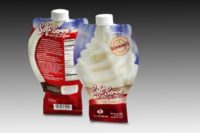Filled packages are inspected every 15 minutes. Samples are pulled from the line and weighed, and a technician reviews label alignment and date stamps for conformance to standards. The first three samples of each run are tested in the in-house lab.
Buttermilk is growing in popularity, as a beverage and as an ingredient in baking. Broadacre increased production to weekly (from every other week) because of demand. It processes the beverage in a 400-gallon vat.
Weigel’s 2% chocolate milk won a 1st place blue ribbon, given by the Tennessee Dairy Products Association, in conjunction with the Tennessee State Fair Fluid Milk Quality Competition. The milk competed in the whole milk category because there was not a division for 2% chocolate milk. In the mixing room, pasteurized milk, cocoa and extra-fine cane sugar are added into two 500-gallon tanks that blend the ingredients. It is this “hand crafting” rather than mechanical dispensing that makes the difference, says plant manager Douglas Rouch. Rouch says the consistency of the chocolate milk production is the result of intense pride of the man on the line overseeing the process.
Egg nog is a seasonal product made with cream, milk, sugar and natural flavors. It is a customer favorite, shipped to 15 states to fans who have moved away. As for the nondairy beverages, Broadacre brews its own tea for sweetened, sugar-free and flavored products. The dairy uses all natural flavors and granulated sugar only. Punches and lemonade are made with 10% juice. Orange juice is made with Valencia oranges.
Weigel’s signature yellow bottles are delivered to the plant on pallets every other day and staged in a room behind the filling line. The bottles are labeled and dated, then conveyed to the filling room. In another room, milk cases are washed and sanitized. In a cold room, milk is staged for loading into delivery trucks during the night shift. Drivers have three to eight stores on their routes.
Food safety
Weigel’s stores put the focus on serving the customer with first-rate products. So Broadacre insists on quality ingredients. Broadacre Dairy was one of the first in the state to include “Our farmers pledge not to use artificial growth hormones” on its packages. The on-site lab tests the raw milk on a number of measures, including antibiotics, pH and temperature. The lab also performs fresh and seven-day coliform and standard plate count tests, as well as 16-day and 19-day smell and taste tests. Milk has a 24-day shelf life. Outside agencies also perform coli tests and standard plate count checks as well as butterfat checks. The processing facility falls under the jurisdiction of the Tennessee Department of Agriculture and the U.S. Food and Drug Administration.
The dairy implements a milk and juice HACCP program. Other programs include foot baths at all entrances to processing rooms, drains, product tracking and case tracking. A lock-out/tag-out program is installed on equipment. Skid- and slip-resistant flooring protects workers. The dairy recently finished a drain upgrade and it is continuing with new floors throughout the plant. Soon, it will double its cooler space and load-out capabilities.
Weigel tells Dairy Foodsthat Broadacre is the smallest dairy the magazine will ever visit. That might not be the case for long. A new filler line is in the works and an additional silo is going up this year. As Weigel’s store count increases, so does the need for dairy and nondairy beverages. The plan is to add four stores a year and to increase the shelf space given to its milk (currently at two and one-half doors). Under consideration is ice cream production, something Broadacre hasn’t done since the 1950s.







